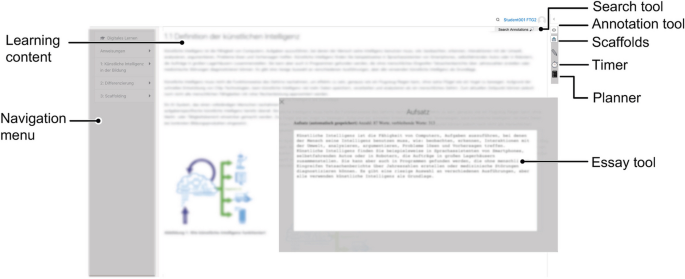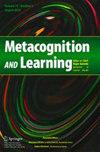如何设计和评估个性化的自我调节学习支架
IF 4.8
2区 教育学
Q1 EDUCATION & EDUCATIONAL RESEARCH
引用次数: 1
摘要
自我调节是终身学习的基本技能。研究表明,自我调节学习(SRL)可以带来更大的学术成就和可持续的教育,但学生经常在SRL方面挣扎。支架作为一种有效的SRL支撑方法被广泛报道。为了进一步提高数字化支架的有效性,可以通过对学习行为的实时检测来实现支架的个性化。因此,本研究旨在通过报道数字支架的设计和评估,为支架SRL领域提供信息。我们提出在个性化支架设计过程中做出的决定,为未来的支架设计提供信息。我们评估了基于实时检测SRL的支架是如何个性化的,大学生对支架的反应(即依从性),以及这种反应与学习成果(即论文质量)的关系。研究设计采用三种条件的前-后测试(无、一般化(所有人都一样)或个性化支架)。使用45分钟的读写任务,在此期间实时记录SRL进程。结果表明,不同的实时SRL过程可以用于个性化支架,这意味着我们可以根据学生的实际学习行为来个性化支架的内容。此外,个性化条件下的学生比其他条件下的学生更遵守脚手架。这种对支架的依从性通常与更好的学习结果相关。总之,我们的方法展示了如何评估设计决策,并为支架的个性化提供了见解。本文章由计算机程序翻译,如有差异,请以英文原文为准。

How to design and evaluate personalized scaffolds for self-regulated learning
Abstract Self-regulation is an essential skill for lifelong learning. Research has shown that self-regulated learning (SRL) leads to greater academic achievement and sustainable education, but students often struggle with SRL. Scaffolds are widely reported as an effective and efficient support method for SRL. To further improve digital scaffolds’ effectiveness, real-time detection of learning behavior can be used to personalize scaffolds. Therefore, the present study aimed to inform the field of scaffolding SRL by reporting on the design and evaluation of digital scaffolds. We present decisions made during the design process of personalized scaffolds to inform future scaffold designs. We evaluated how scaffolds were personalized based on real-time detection SRL, how university students respond to the scaffolds (i.e., compliance), and how this response is related to learning outcomes (i.e., quality of an essay). The research design was a pre-posttest with three conditions (no, generalized (same for all), or personalized scaffolds). A 45-minute reading and writing task was used, during which SRL processes were recorded in real-time. Findings revealed that different real-time SRL processes could be used to personalize scaffolds, meaning that we were able to personalize the content of scaffold based on students’ actual learning behavior. In addition, students in the personalized condition complied more with the scaffolds than students in the other conditions. This compliance with the scaffolds was generally associated with better learning outcomes. To conclude, our approach showed how design decisions could be evaluated and provided insight into the personalization of scaffolds.
求助全文
通过发布文献求助,成功后即可免费获取论文全文。
去求助
来源期刊

Metacognition and Learning
Multiple-
CiteScore
6.20
自引率
15.20%
发文量
39
期刊介绍:
The journal "Metacognition and Learning" addresses various components of metacognition, such as metacognitive awareness, experiences, knowledge, and executive skills.
Both general metacognition as well as domain-specific metacognitions in various task domains (mathematics, physics, reading, writing etc.) are considered. Papers may address fundamental theoretical issues, measurement issues regarding both quantitative and qualitative methods, as well as empirical studies about individual differences in metacognition, relations with other learner characteristics and learning strategies, developmental issues, the training of metacognition components in learning, and the teacher’s role in metacognition training. Studies highlighting the role of metacognition in self- or co-regulated learning as well as its relations with motivation and affect are also welcomed.
Submitted papers are judged on theoretical relevance, methodological thoroughness, and appeal to an international audience. The journal aims for a high academic standard with relevance to the field of educational practices.
One restriction is that papers should pertain to the role of metacognition in learning situations. Self-regulation in clinical settings, such as coping with phobia or anxiety outside learning situations, is beyond the scope of the journal.
 求助内容:
求助内容: 应助结果提醒方式:
应助结果提醒方式:


